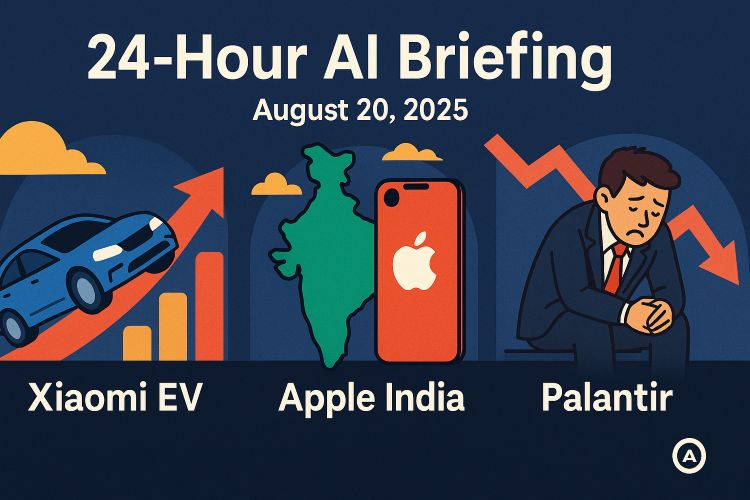AI Navigation
- articleAI Trends
- lightbulb_2AI Tips
- assistant_navigationAI Navigation
- heatHot Articles
- emergency_heat_2Hot Tips
- format_list_numberedPrompt Formatter
- psychologyTest Center(RPI)
August 20, 2025 · 24-Hour AI Briefing: Xiaomi EV Milestone, Apple Reshapes Supply Chain, Palantir Faces Valuation Pressure
Over the past 24 hours, the AI and tech landscape has continued to deliver noteworthy developments. Xiaomi attracted market attention with rapid progress in its EV and AI businesses, Apple moved to further diversify its global supply chain, and Palantir came under pressure as concerns around AI-driven valuation bubbles intensified. Here are the three key events you shouldn’t miss:

1. Xiaomi Reports Strong Q2 and Eyes Profitability in EV Business
Xiaomi reported net profit of RMB 11.9 billion in Q2, up 113.5% YoY, and adjusted net profit of RMB 10.83 billion, up 75.38% YoY. Total revenue reached RMB 116 billion, a 30.5% increase YoY and the third consecutive quarter above the RMB 100 billion mark.
Revenue from Xiaomi’s smart EV and AI innovation businesses surged 234% YoY to RMB 21.3 billion, while operating losses narrowed to RMB 300 million. In Q2, the company delivered 81,300 vehicles, bringing its cumulative deliveries to 300,000 units. Sales mix improved as the high-margin SU7Ultra model completed its first full delivery quarter.
Xiaomi invested RMB 7.8 billion in AI during the quarter (+41.2% YoY), of which approximately RMB 1.95 billion was allocated to AI-related technologies, including the MiLM-12B on-device large model, the NPU chip XuanTie X1 and autonomous driving. Going forward, it plans to further increase AI investment, focusing on in-vehicle connectivity and home AI use cases, with an emphasis on bringing large model capability onto devices.
Commentary: Xiaomi expects its EV business to become profitable in the second half of the year — a key milestone for any company entering a highly competitive new market. This demonstrates strong product competitiveness and highlights the company’s efficiency in supply chain management and cost control. Xiaomi’s on-device AI strategy, focused on low latency and privacy protection, is a distinctive and strategic differentiator.
2. Apple to Manufacture Entire iPhone 17 Lineup in India to Reduce Supply Chain Risk
Apple announced plans to expand iPhone production in India, and for the first time, will produce all four models of the iPhone 17 series in the country to reduce dependency on third-party supply chains and mitigate tariff impact.
The expansion involves new factories built in partnership with Tata Group and Foxconn. Over the past four months alone, iPhone exports from India reached USD 7.5 billion.
Commentary: Following rising global tariff tensions, Apple has significantly accelerated its supply-chain diversification strategy. Manufacturing in India not only helps the company avoid potential trade barriers, but also leverages lower labor costs to optimise its global production structure. By partnering with local companies such as Tata Group, Apple is embedding itself deeper into India’s supply chain ecosystem — and strengthening its presence in a fast-growing consumer market.
3. Palantir Slumps for Five Consecutive Sessions as Valuation Concerns Intensify
Palantir — previously the most expensive stock in the S&P 500 — has fallen for five consecutive trading days since August 13. Investors had been betting on its AI-powered growth potential and lucrative government contracts, but sentiment has turned sharply negative in recent days.
Commentary: Palantir is widely considered to be highly overvalued. To trade in line with industry peers, the company would need to generate at least USD 60 billion in annual revenue — yet its revenue forecast for 2025 is only USD 4 billion. This valuation gap has become a major reason for the recent price correction.
For more cutting-edge AI news, business insights and tech trends, visit https://iaiseek.com
Want to know what happened in the AI space over the past 72 hours? Read:
August 19, 2025 · 24-Hour AI Briefing: Cybersecurity Momentum, SoftBank Bets on Intel, AI Cloud Competition Intensifies